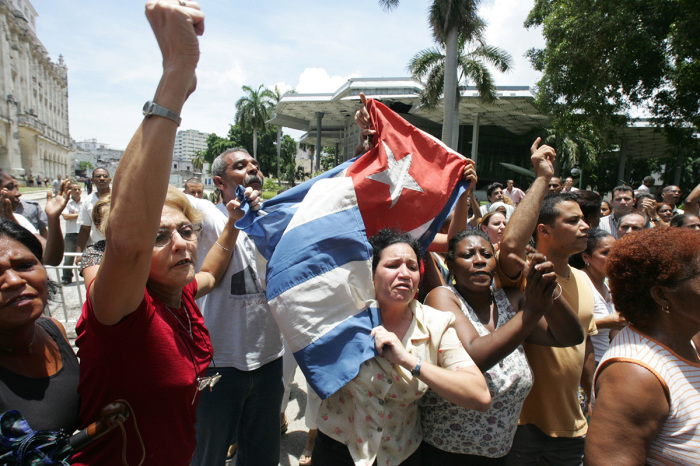Number of political prisoners in Cuba increased five-fold last year, watchdog reports

The number of political prisoners in the communist country of Cuba, which stood at about 134 last December, increased to at least 805 by the end of November, a new report by a rights organization shows.
“These are a small fraction of the real figures,” says the Madrid-based watchdog group Prisoners Defenders, noting that it’s not possible to verify all cases of political imprisonment and therefore the actual number is likely to be much higher.
At least 23 of the political prisoners were minors at the time of their detention and are “being criminally prosecuted with numerous years’ imprisonment requested for most of them,” the report reveals, adding that the average age of the imprisoned protesters is 34, although Cuba is “one of the most ageing countries in the world.”
The majority of the prisoners are “convicts of conscience,” the report adds, explaining that they are “prisoners deprived of their liberty solely for reasons of conscience, i.e. the strict exercise of their most fundamental human rights, on charges that are either completely and demonstrably false and fabricated, or of a non-criminal nature and absolutely related to thought.”
Many others have been “condemned of conscience, who suffer prosecutor’s orders or judicial sentences” of forced labour at home, limited freedom, probation under threat and other limitations to their freedoms.
Some are “other political prisoners,” whose cases are concerning violence or other punishable offences in addition to their political imprisonment.
In July, the people of Cuba demonstrated their anger against the communist government in what was said to be the largest protest in decades amid shortages of medicine and food during the pandemic.
Protests were held in cities around the Caribbean island country, including in San Antonio de los Baños, Palma Soriano and Havana, according to reports that emerged at the time.
International travel restrictions and the monthslong COVID-19 lockdown within the country compacted the country's already spiraling economic crisis. Hours after the protests erupted, President Díaz-Canel addressed the nation on national television, urging the regime's supporters to confront the protesters on the streets. He also accused the U.S. of causing the crisis in Cuba by imposing sanctions.
During the protests, many religious leaders were also targeted, arrested and beaten.
“Cuban authorities are detaining religious leaders merely for peacefully protesting and calling for greater respect for human rights,” said James W. Carr, a commissioner with the U.S. Commission on International Religious Freedom, in a statement at the time.
“Principal among human rights concerns in Cuba are the ongoing and systematic violations of religious freedom, which include the persistent intimidation and harassment of religious leaders.”
Last month, Cuban President Miguel Díaz-Canel claimed, “There are no political prisoners in Cuba,” according to Havana Times. “In Cuba there are many processes that are public, to discuss programs, to discuss policies as we did with the Constitution. In everyday life there are people who speak ill of the Revolution. What happens is that many times this type of person whom they manipulate and use for that, or those who by their own conviction are against the Revolution, leads them to commit crimes.”
According to the Pew-Templeton Global Religious Futures Project, about 59% of Cubans are Christian. Cuban Christians also face constant government surveillance and infiltration even though the faith is growing in the island country.
The Cuban government amended its Constitution in 1992, declaring it a secular state, instead of an atheist state, partially allowing religious activities. Since then, the percentage of the country’s population that identifies as Christian has grown.
However, the communist regime of Cuba continues to persecute Christians. A new constitution was adopted in 2019, which also lists the country as a secular state.
Cuba has been a one-party state under the Communist Party of Cuba since the late dictator Fidel Castro overthrew the United States-supported dictatorship of Fulgencio Batista in 1959. In 2008, Castro’s brother, Raul Castro, was elected president, followed by Miguel Díaz-Canel in 2019.




























